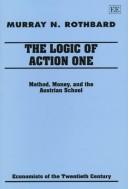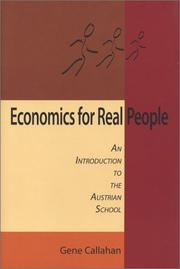| Listing 1 - 10 of 154 | << page >> |
Sort by
|
Book
ISBN: 1852785810 Year: 1994 Publisher: Cheltenham : Elgar,
Abstract | Keywords | Export | Availability | Bookmark
 Loading...
Loading...Choose an application
- Reference Manager
- EndNote
- RefWorks (Direct export to RefWorks)

ISBN: 1858980151 Year: 1997 Publisher: Cheltenham : Elgar,
Abstract | Keywords | Export | Availability | Bookmark
 Loading...
Loading...Choose an application
- Reference Manager
- EndNote
- RefWorks (Direct export to RefWorks)

ISBN: 0945466358 Year: 2002 Publisher: Auburn (Ala.) : Mises Institute,
Abstract | Keywords | Export | Availability | Bookmark
 Loading...
Loading...Choose an application
- Reference Manager
- EndNote
- RefWorks (Direct export to RefWorks)
Book
ISBN: 9781847207685 9781847207692 Year: 2008 Publisher: Cheltenham Elgar
Abstract | Keywords | Export | Availability | Bookmark
 Loading...
Loading...Choose an application
- Reference Manager
- EndNote
- RefWorks (Direct export to RefWorks)
Book
ISBN: 1282752960 9786612752964 0857242628 9780857242624 9780857242617 085724261X Year: 2010 Publisher: Bingley, UK Emerald
Abstract | Keywords | Export | Availability | Bookmark
 Loading...
Loading...Choose an application
- Reference Manager
- EndNote
- RefWorks (Direct export to RefWorks)
Leading scholars consider Austrian economics from several perspectives such as characteristic themes of entrepreneurship and uncertainty, scientific methods such as mathematical complexity theory and experimental economics, and historical contexts such as pre-war Vienna and post-war France. Placing "Austrian economics" in these multiple contexts helps to reveal the rich texture of the Austrian tradition in social thought and its multiple connections to current research in diverse fields. Applications to the theory of the trade cycle and to foreign intervention suggest that the Austrian tradition contains possibilities not yet full explored and exploited. The volume gathers together papers presented at the second biennial Wirth conference on Austrian economics, held in October 2008 when the crisis of Fall 2008 was still new and shocking. This coincidence of timing makes policy issues and crisis management a kind of leitmotif of the volume. If, as keynote speaker David Colander argues, Austrians have a comparative advantage in political economy, then its stock should rise in times of crisis and political uncertainty. The volume provides evidence in favor of this view. Contributors include David Colander, Richard Wagner, Jeffery McMullen, J. Barkley Rosser, Jr., Steve Horwitz, Richard Ebeling, Chris Coyne, and Peter Boettke.
Book
ISBN: 3960922809 Year: 2018 Publisher: München : FBV,
Abstract | Keywords | Export | Availability | Bookmark
 Loading...
Loading...Choose an application
- Reference Manager
- EndNote
- RefWorks (Direct export to RefWorks)
Book
ISBN: 1948647966 Year: 2020 Publisher: Washington, District of Columbia : Cato Institute,
Abstract | Keywords | Export | Availability | Bookmark
 Loading...
Loading...Choose an application
- Reference Manager
- EndNote
- RefWorks (Direct export to RefWorks)
"What if economics began with people? Carl Menger. Ludwig von Mises. F.A. Hayek. Murray Rothbard. Israel Kirzner. They're some of the most important and acclaimed economists of the modern era, and they all belong to an intellectual tradition known as the Austrian School of Economics. While many economists model people's behavior using idealized assumptions, Austrian economists begin by taking people as they are and build economic theories by examining the logical structure of the choices they make. This book introduces the key thinkers of the Austrian School and explains their insights on a wide range of economic topics. It also explains the relationship between the Austrian School and mainstream economics and delves into the criticisms Austrian School economists have mounted against communist and socialist economic thought"--
Book
ISBN: 1136823557 1136823565 1283241986 9786613241986 020383061X Year: 2011 Publisher: Abingdon, Oxon ; New York, N.Y. : Routledge,
Abstract | Keywords | Export | Availability | Bookmark
 Loading...
Loading...Choose an application
- Reference Manager
- EndNote
- RefWorks (Direct export to RefWorks)
First published in 1986, this book presents a reissue of the first detailed confrontation between the Austrian school of economics and Austrian philosophy, especially the philosophy of the Brentano school. It contains a study of the roots of Austrian economics in the liberal political theory of the nineteenth-century Hapsburg empire, and a study of the relations between the general theory of value underlying Austrian economics and the new economic approach to human behaviour propounded by Gary Becker and others in Chicago. In addition, it considers the connections between Austrian methodology
Book
ISBN: 1838674055 Year: 2020 Publisher: Bingley, England : Emerald Publishing,
Abstract | Keywords | Export | Availability | Bookmark
 Loading...
Loading...Choose an application
- Reference Manager
- EndNote
- RefWorks (Direct export to RefWorks)
Philosophy, Politics, and Economics, as an interdisciplinary endeavour, has surged in popularity in recent years. Work in this field usually draws on standard microeconomics to grapple with questions from political philosophy. But what might Austrian economics, which provides an alternative approach, have to offer to this endeavour?
Book
Year: 1962 Publisher: Cambridge: Belknap press of Harvard university press,
Abstract | Keywords | Export | Availability | Bookmark
 Loading...
Loading...Choose an application
- Reference Manager
- EndNote
- RefWorks (Direct export to RefWorks)
| Listing 1 - 10 of 154 | << page >> |
Sort by
|

 Search
Search Feedback
Feedback About UniCat
About UniCat  Help
Help News
News